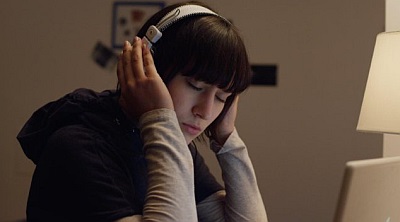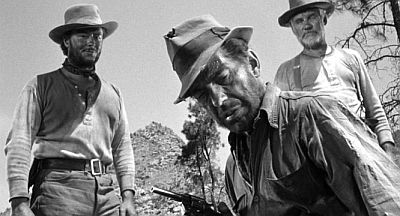Originally posted on 11/29/16
I've always had an unreasoning fear of Merchant Ivory movies. I was afraid that if I watched one, I would slowly sink into a murky mire of stiff drawing room drama that would bore me into submission and entomb me in a calcified shell of stilted dialogue and labored social entanglements.
Having just watched my first one, however, I must say that I may have misjudged the genre. For HOWARDS END (1992, Cohen Film Collection), probably the crown jewel in the celebrated oeuvre of distinguished producer Ismail Merchant and director James Ivory, is not only solidly engaging on a literary basis but also about as impeccably rendered a period piece as one might ever hope to enjoy.
The film does invite repeat viewings in order to peel away its various layers and to pick up on what I find to be a rich vein of visual symbolism akin to the days of silent cinema. (Much of which, admittedly, was pointed out to me while listening to the engaging commentary track.)
The story, which takes place in England shortly after the turn of the 20th century, is all about that country's rigid class system and how people from the different strata of society were expected to interact in relation to one another.
In this case, that includes the wealthy, upperclass Wilcox family, their middleclass acquaintances the Schlegels, and a young lowerclass couple, Leonard Bast and his blowsy, disreputable "wife" Jacky (they're actually living in sin, so to speak), whose inadventent contact with the above will lead to tragedy as well as general interpersonal crises for everyone involved.
It all revolves around a quaint old country house called Howards End which is owned by Mrs. Ruth Wilcox (Vanessa Redgrave), who holds her old family estate in deeply fond esteem. Stiff, unimaginative husband Henry (Anthony Hopkins) is the opposite of his warm, emotionally open wife, and sees the house only as a bit of real estate. Their children, on the other hand--sons Charles and Paul, and daughter Evie--eye it with jealous envy.
All are shocked when a deep friendship between Mrs. Wilcox and the oldest Schlegel sister, Margaret (Emma Thompson), results in Mrs. Wilcox leaving Howards End to Margaret upon her death. While the Wilcoxes secretly burn the scribbled will, an awkward romance between Henry and Margaret threatens to give her ownership of the house after all.
Meanwhile, Margaret's younger sister Helen (Helena Bonham Carter), a free-thinker with a rebellious streak, is enraged when Henry inadvertently causes Leonard to lose his precious job and then stubbornly refuses to admit fault or help the penniless man. This causes a deep divide between the two sisters and exacerbates tensions between the families which will eventually result in heated conflict and, finally, a violent incident.
HOWARDS END is (very) high-end soap opera in a way, with Margaret marrying Henry mainly because the Schlegels--including ne'er-do-well brother Tibby--are about to lose the lease on their own house. This compels her to reluctantly adopt the stuffy ways of the upper class even as Henry's lofty disregard for the Basts enrages Helen to the point where she flees to Germany and refuses to return home.
On a deeper level, the film is a fascinating examination of the implacable and largely inexplicable social mores which existed in England at that time and kept the poor in their place with little hope of advancement while the privileged class enjoyed an infinitely superior lifestyle.
Despite a relatively modest budget, there's nothing even remotely flimsy or cheapjack about this production. The film is gorgeous in every aspect, a dazzling evocation of the period with a wealth of ideal locations that are consistently pleasing to the eye.
James Ivory directs with great taste, subtlety, and skill, with a style that doesn't draw attention to itself. The screenplay by Ivory and co-writer Ruth Prawer Jhabvala, adapted from the original novel by E. M. Forster, maintains a high literary standard throughout and is filled with choice dialogue including a fair amount of pointed humor.
Anthony Hopkins and Emma Thompson are first-rate and work beautifully together as the charmingly awkward couple Henry and Margaret. The young Helena Bonham Carter is utterly captivating as Helen--when I see her, I'm reminded of the Old Hollywood saying "They had faces in those days." She would've been a natural for silent films and brings immeasurable presence to a period piece such as this. In her brief role as the first Mrs. Wilcox, the great Vanessa Redgrave is disarmingly warm and as memorable as always.
Other supporting roles are ideally cast, such as Samuel West and Nicola Duffett as the unfortunate Basts. James Wilby does a fine job as Henry's dull older son Charles, whose clumsy efforts to gain his father's approval while trying to wrest Howard's End away from his new stepmother often border on the pathetic.
As Charles' flighty and rather flaky wife Dolly, Susie Lindeman adds a touch of comedy to the story, as does Prunella Scales, whom most will remember as Sybil Fawlty in the BBC classic "Fawlty Towers", as the Schlegels' Aunt Juley.
The 2-disc Blu-ray from Cohen Film Collection comes in an attractive slipcase which includes an illustrated 26-page booklet containing film credits and essays by James Ivory, John Pym, and production designer Luciana Arrighi.
Disc 1 contains the 16x9 widescreen feature film (looking fine with a new 4K restoration) with an exhaustive commentary by critics Wade Major and Lael Lowenstein. English subtitles are available. (The subtitles have an annoying PC tendency to replace the word "Miss" with the more modern term "Ms." which was coined several decades after the story takes place. This happens in a lot of subtitles these days and is a pet peeve of mine.)
Disc 2 contains the original and re-release trailers and the following featurettes:
--2016 conversation with James Ivory and Laurence Kardish, former Senior Curator of Film, MoMA
--2016 Cannes Film Festival interview with James Ivory and Vanessa Redgrave
--2016 Film Society of Lincoln Center Q & A with James Ivory
--Building Howards End
--The Design of Howards End
--1992 Behind-the-Scenes short featurette with comments by cast and crew
--James Ivory remembers Ismail Merchant
HOWARDS END is British drawing room drama with all the windows thrown open and the fresh air and sunshine allowed to come in, making it both an edifying intellectual experience and a refreshment for the senses. In trying to describe it, I keep coming back to the word "impeccable", a quality that's in pretty short supply these days.
























































